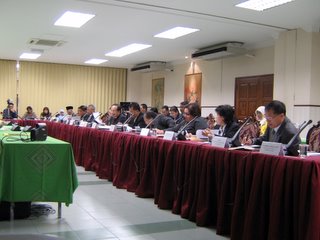

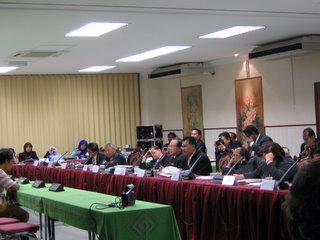
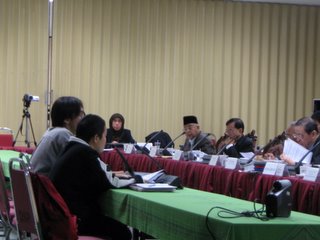
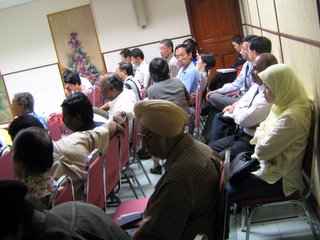
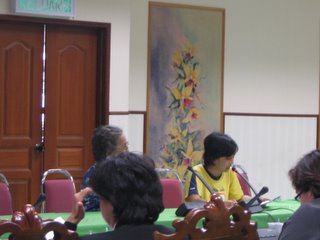
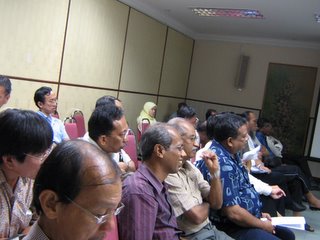

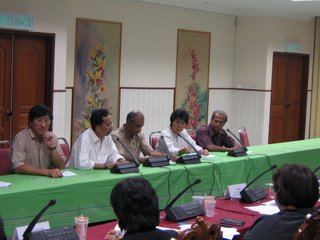
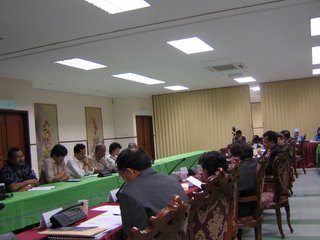
A public hearing conducted by Parliamentary Select Committee on Integrity was held at Dewan Sri Pinang, in Penang today. The hearing started at 10 am and ended at 6 pm. About 20 groups and individuals came forward to submit their observations and suggestion in front of the Select Committee.
Among the groups which made submission today are Consumer Association of Penang (CAP) Aliran, Anti-PORR committee, Malaysian Voters Union, Citizens for Public Transport (CEPAT), USM students, DAP, Gerakan etc.
A lot of issues were raised, ranging from specific cases to general recommendations. The calls for repeal of Official Secrets Act (OSA), enactment of Freedom of Information Act, restoration of local council elections, parliamentary reform, and protection of press freedom among the suggestions put forward to the select committee.
Below is the submission made by SUARAM Penang:
Recommendations of SUARAM
to the
Parliamentary Select Committee on Integrity
Suara Rakyat Malaysia Penang Branch (SUARAM Penang) welcomes the setting up of Parliamentary Select Committee as a positive move to promote a direction to a more open, democratic and progressive society. Integrity is indivisible to hold every government formed through democratic process to be responsible and accountable to its people.
SUARAM Penang views that in this process, the rule of law, human rights principles and civil society norms enshrined in international conventions and treaties must be adhered. SUARAM Penang also views that the effort to promote and enhance integrity in our country, has to be accompanied by actions taken to fulfill fundamental liberties of all citizens and create a more open democratic space for people’s participation in decision-making process locally and nationally.
SUARAM Penang would like to make following observations and recommendations:
1. Freedom of Information
The right to access information held by authorities is included in the right to seek, receive and impart information. These fundamental rights has guaranteed by Article 19 of the Universal Declaration of Human Rights. We must stress that Public bodies hold information not for themselves but on behalf of the public. It is undeniable that everyone has the right to know.
A recent example is the refusal of Economic Planning Unit to provide a copy of Terms of Reference (TOR) on the appointment of consultant for implementation of National Heath Financing Scheme, when requested by civil society groups, and the reason was the document and the name of consultant is confidential. Such incident should not be happened in a transparent and accountable government, and especially with regards to implementation of policies that will affect the whole population.
SUARAM Penang also suggests passing a comprehensive freedom of information law based on the right to information which establishes the principle of maximum disclosure. Access to information is a basic necessity and right, not a luxury, indispensable to the aim of
2. Open Meetings and Availability of Information
The government should establish a general presumption that official meetings are open to the public. This presumption may only be overridden by a specific decision of the meeting and that such a decision is to be made in public. Details regarding the time, date and venue of these meetings should be made easily available to the public. This is a constructive step towards establishing transparent practices at every level of government.
Public bodies also should routinely make available a wide range of information of public interest. A commitment should be made, over time, to publish all information which anyone might wish to access. This information should be made available on an equal, non-discriminatory basis.
A specific commitment should be made to ensure that all individuals and groups affected by a project, development or policy are provided with all relevant information about that project, development or policy. This information should be provided in an appropriate language and medium.
3. Participatory Decision Making Process
SUARAM Penang believes that it is impossible to create good governance that observed integrity, without a mechanism of check and balance from below, from the people. It is crucial to allow and empower people at grassroots level to involve in decision-making process, with regards to any amendment of laws, policy making, development project etc. Democratic control by the people with the redistribution power to people, is most essential to preserve integrity.

No comments:
Post a Comment